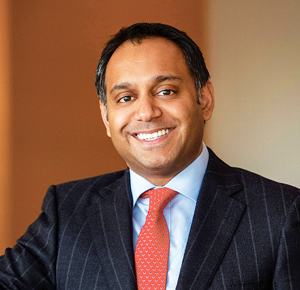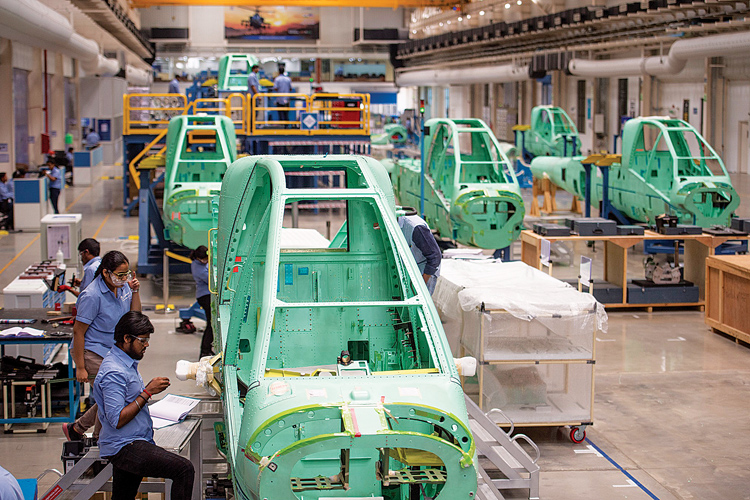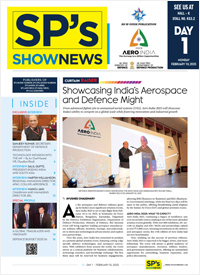“Boeing is India's Largest Foreign Aerospace OEM”
Salil Gupte President, Boeing India and South Asia in conversation with SP's ShowNews

SP's ShowNews (SP's): How does Boeing's 80-year history in India shape its current role as the leading foreign OEM in its aerospace and defence sector?
Salil Gupte (Gupte): Boeing's unwavering commitment to India's aerospace and defence sector over the past eight decades has laid the foundation for its leadership today. From delivering advanced aircraft to building a robust aerospace and defence ecosystem, our journey reflects a deep and evolving partnership with India. Over the decades, we have transitioned from delivering advanced aircraft to contributing to India's entire aerospace and defence ecosystem. As a steadfast partner, Boeing has played a vital role in supporting the mission readiness and modernisation of India's defence forces while also being a key contributor to the growth of its commercial aviation sector. Today, Boeing is India's largest foreign aerospace OEM, with significant manufacturing, engineering, and skill development investments. We are strategically aligned and positioned to support the growth of India's civil and defence aviation requirements by providing efficient airplanes, worldclass services, and innovative solutions aligned with the Government's "Aatmanirbhar Bharat" vision. We continue investing in India, creating local partnerships and jobs to strengthen the manufacturing sector and fostering an ecosystem that nurtures the talent needed to serve global and local aerospace and defence markets.
SP's: What distinguishes Boeing's partnerships and collaborations with Indian organisations from other foreign OEMs?
Gupte: Boeing's partnerships in India are deeply collaborative and designed to drive long-term growth for both our global operations and India's aerospace ecosystem. With over $1.25 billion in annual sourcing, 70 per cent of this sourced from manufacturing, and collaborations with 300+ supplier partners, including over 25 per cent being Micro, Small & Medium Enterprises (MSMEs), Boeing stands out for its commitment to integrating local expertise into our global supply chain. We also have a dedicated and fast-growing supply chain team based in India that focuses on developing new suppliers, including MSMEs. This effort has been pivotal in the growth of our network, which is propelled by significant advancements in quality and capability along the value curve. Our suppliers are transitioning from simple assemblies to more complex ones, including advanced materials like composites and thermoplastics, and employing technologies such as full-size determinant assembly (FSDA) and robotics.
SP's: How is Boeing's commitment to initiatives like "Make in India" and "Aatmanirbhar Bharat" driving indigenous aerospace and defence manufacturing?
Gupte: Boeing's steadfast commitment to "Make in India" and "Aatmanirbhar Bharat" is evident in our strategic investments, partnerships, and innovations that help grow India's aerospace and defence ecosystem. Our approach goes beyond transactions—we collaborate to co-develop advanced solutions, drive innovation, and foster indigenous manufacturing and skill development.

An example that stands out is Tata Boeing Aerospace Limited (TBAL) in Hyderabad, a state-of-the-art facility that integrates cutting-edge technology with indigenous manufacturing. TBAL produces aero-structures for Boeing's AH-64 Apache helicopter, including fuselages, secondary structures, and vertical spar boxes. With now over 300 fuselages delivered globally, including to the US Army, more than 90 per cent of the fuselage parts are manufactured in India, sourced from network of over 100 MSME suppliers. TBAL also has a more recent production line that manufactures vertical fin structures for 737.
Our supplier ecosystem in India has consistently achieved global recognition, with partners such as Cyient, Tata, Rossell, and Dynamatic Technologies Limited receiving Boeing's prestigious "Supplier of the Year" award among a competitive network of over 11,000 suppliers worldwide. This highlights the exceptional quality and capabilities of Indian suppliers, reinforcing their growing role in global aerospace manufacturing. Through initiatives like these, Boeing continues to drive India's indigenous aerospace ambitions, strengthening local manufacturing capabilities and advancing the country's vision of self-reliance in the sector.
SP's: With over $1.25 billion in annual sourcing from India, what factors have contributed to the growth and success of this relationship?
Gupte: Today, India's aerospace and defence sector is experiencing a burgeoning growth that is attracting diverse talent. The country's traditional strengths in engineering, extending beyond software to encompass broader engineering disciplines, have converged with a substantial improvement in manufacturing quality over the past decade. This combination of engineering excellence and enhanced manufacturing capabilities presents a remarkable opportunity for industrial companies to invest in India. Additionally, initiatives like "Make in India," financial incentives, and infrastructure development, have created a conducive environment for growth. With over eight decades of presence in India, Boeing's investments over time, reflect our confidence in the country's potential. Boeing will continue to invest in local manufacturing, co-production, co-development, skill enhancement, and innovation initiatives to support the growth of the overall aerospace, defence and commercial aviation ecosystem.
SP's: How does Boeing's investment in the new 43-acre Bengaluru campus enhance its in-country presence and capabilities?
Gupte: The Boeing India Engineering & Technology Center (BIETC) campus in Bengaluru represents Boeing's largest investment outside the United States. The center employs over 6,500 engineers and innovators across Bengaluru and Chennai, driving advancements in aerospace and supporting growth in the sector. These technologists are engaged in advanced, high-quality aerospace work, contributing expertise to Boeing's defence, space, and commercial divisions, including engineering design, manufacturing support, systems testing, and digital solutions for airline customers.
BIETC is at the forefront of cutting-edge research and development in traditional and emerging fields. Its focus areas include next-generation airplane health management, environmentally friendly coatings, advanced networks, and secure communications. The teams leverage modern technologies like Artificial Intelligence, Machine Learning, the Internet of Things, Cloud computing, Model-Based Engineering, and Additive Manufacturing to enhance quality, safety, and productivity.
With a significant portion of Boeing's global talent pool based in India, BIETC offers a distinct advantage, particularly in digital solutions. BIETC develops solutions tailored to Indian customers while also creating Indian intellectual property. This also positions BIETC as a key resource to meet Boeing Defence India's (BDI) future engineering needs, supporting general operations, service engineering, and development-focused initiatives, including co-development and indigenous programmes.
SP's: What can we expect from Boeing at Aero India 2025?
Gupte: We are excited to be at Aero India 2025 and will continue to highlight Boeing's investments in India to build an integrated aerospace ecosystem. Our focus will be on demonstrating how Boeing is fostering collaboration across civil aviation, defence, urban air mobility, and MRO sectors to drive innovation, optimise resources, and expand manufacturing capabilities. By strengthening these connections, we aim to position India as a global aerospace hub, addressing both military and civilian aviation needs with cutting-edge technologies and solutions. Through this integrated approach, we are committed to supporting India's growth and competitiveness in the global aerospace market.





